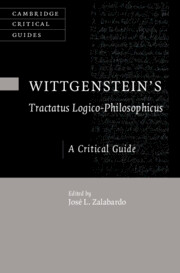Book contents
- Wittgenstein’s Tractatus Logico-Philosophicus
- Cambridge Critical Guides
- Wittgenstein’s Tractatus Logico-Philosophicus
- Copyright page
- Contents
- Contributors
- Introduction
- Chapter 1 Wittgenstein’s Impatient Reply to Russell
- Chapter 2 Modality in Wittgenstein’s Tractatus
- Chapter 3 Clarification and Analysis in the Tractatus
- Chapter 4 The Fish Tale: The Unity of Language and the World in Light of TLP 4.014
- Chapter 5 That Which ‘Is True’ Must Already Contain the Verb: Wittgenstein’s Rejection of Frege’s Separation of Judgment from Content
- Chapter 6 Solipsism and the Self
- Chapter 7 The Tractatus and the First Person
- Chapter 8 Arithmetic in the Tractatus Logico-Philosophicus
- Chapter 9 ‘Normal Connections’ and the Law of Causality
- Chapter 10 The Ethical Dimension of the Tractatus
- Chapter 11 “Obviously Wrong”: The Tractatus on Will and World
- References
- Index
- Cambridge Critical Guides
Chapter 2 - Modality in Wittgenstein’s Tractatus
Published online by Cambridge University Press: 07 March 2024
- Wittgenstein’s Tractatus Logico-Philosophicus
- Cambridge Critical Guides
- Wittgenstein’s Tractatus Logico-Philosophicus
- Copyright page
- Contents
- Contributors
- Introduction
- Chapter 1 Wittgenstein’s Impatient Reply to Russell
- Chapter 2 Modality in Wittgenstein’s Tractatus
- Chapter 3 Clarification and Analysis in the Tractatus
- Chapter 4 The Fish Tale: The Unity of Language and the World in Light of TLP 4.014
- Chapter 5 That Which ‘Is True’ Must Already Contain the Verb: Wittgenstein’s Rejection of Frege’s Separation of Judgment from Content
- Chapter 6 Solipsism and the Self
- Chapter 7 The Tractatus and the First Person
- Chapter 8 Arithmetic in the Tractatus Logico-Philosophicus
- Chapter 9 ‘Normal Connections’ and the Law of Causality
- Chapter 10 The Ethical Dimension of the Tractatus
- Chapter 11 “Obviously Wrong”: The Tractatus on Will and World
- References
- Index
- Cambridge Critical Guides
Summary
Wittgenstein’s Tractatus deploys modal vocabulary, especially “possibility.” Some readers take this to signal commitment to substantive modal theories. For others, it is metaphysical nonsense to be thrown away. We steer a middle path. We uncover the central role of possibility in Wittgenstein’s philosophical development from criticism of Russell’s multiple-relation theory of judgment to the conception of propositions as pictures in the Tractatus. In this conception, modality is not the subject matter of theorizing but an ineluctable aspect of picturing of reality whose showing forth Wittgenstein aims to help us see by operationalizing the construction of propositions.
Keywords
- Type
- Chapter
- Information
- Wittgenstein's Tractatus Logico-PhilosophicusA Critical Guide, pp. 24 - 49Publisher: Cambridge University PressPrint publication year: 2024
- 1
- Cited by

